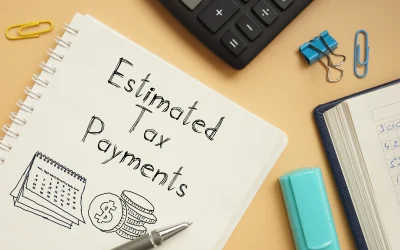Married couples have the option to file their taxes jointly or separately. While the majority of couples choose to file jointly, there are circumstances where filing separately may be beneficial. However, this decision should not be taken lightly as it can have significant implications on your tax liability. This article will delve into the reasons why someone might choose to file separately, as well as the potential downsides of this filing status.
Before we start, I want to preface this conversation by saying that most taxpayers we talk to are better off filing jointly instead of separately but there some cases which we discuss here that separately may be beneficial.
Lets dig in!
Why Choose Married Filing Separately?
There are several reasons why a couple might choose to file their taxes separately:
- Separation of Tax Liability: Filing separately means each spouse is only responsible for their own tax liability. This can be particularly beneficial if one spouse has significant tax debt or is involved in questionable tax practices.
- High Medical Expenses: If one spouse has significant medical expenses, filing separately might allow for a larger deduction. Medical expenses can only be deducted if they exceed 7.5% of your adjusted gross income (AGI). By filing separately and thus lowering the AGI, more of these expenses could exceed the threshold.
- Itemized Deductions: If one spouse has large itemized deductions that are limited by AGI, filing separately could potentially increase those deductions.
- Income-Based Student Loan Payments: For those on income-driven repayment plans for student loans, filing separately could result in lower monthly payments, as the income of the other spouse won’t be considered.
Downsides of Married Filing Separately
While there are situations where filing separately can be beneficial, there are also significant downsides to consider:
- Higher Tax Rates: Generally, the tax rates are higher for those who file separately compared to those who file jointly. This could result in a higher overall tax liability.
- Loss of Tax Benefits: Many tax credits and deductions are reduced or not available to those who file separately. These include the Earned Income Tax Credit, the Child and Dependent Care Credit, the Adoption Credit, and deductions for education loan interest and tuition and fees.
- Education tax credits: The American Opportunity Credit and Lifetime Learning Credit are not available to those who file separately.
- Child and Dependent Care Tax Credit: This credit is generally not available to those who file separately, with few exceptions.
- Earned Income Tax Credit (EITC): The EITC is not available to those who file separately.
- Student loan interest deduction: You cannot deduct student loan interest if you file separately.
- Retirement savings contributions credit: The income limit for this credit is halved for those who file separately.
- Potential for Double Taxation: In community property states, income and deductions may need to be split 50/50. This could potentially result in double taxation on some income.
- Complexity: Filing separately can be more complex, particularly if you live in a community property state. It may also require more time and potentially higher tax preparation fees.
The Process of Filing Separately
When you choose to file separately, you and your spouse will each need to complete your own tax returns. This involves reporting your individual incomes, deductions, and credits. You’ll also need to decide who will claim any dependents. It’s important to note that if one spouse itemizes deductions, the other must do so as well, even if their standard deduction would be higher.
Impact on State Taxes
The decision to file separately can also impact your state taxes. Some states require married couples to use the same filing status on their state returns as they do on their federal returns. However, other states allow couples to choose a different filing status. It’s crucial to understand the rules in your state before making a decision.
Examples of When to File Separately
To provide a clearer picture, let’s consider a few examples:
- Example 1: John and Jane are married. John has a significant amount of student loan debt and is on an income-based repayment plan. Jane earns significantly more than John. By filing separately, John’s monthly student loan payments are based only on his income, not their combined income.
- Example 2: Mary and Mark are married. Mary has high medical expenses due to a chronic illness. By filing separately, Mary’s AGI is lower, allowing her to exceed the 7.5% threshold for deducting medical expenses.
- Example 3: Sarah and Sam are married. Sam has a tax lien from unpaid taxes before their marriage. By filing separately, Sarah protects her refund from being applied to Sam’s tax debt.
Conclusion
Choosing to file your taxes as married filing separately is a decision that should be made after careful consideration and potentially with the advice of a tax professional. While there are situations where it can be beneficial, it can also result in a higher tax liability and loss of tax benefits. It’s important to weigh the pros and cons and consider your individual circumstances before making this decision.
-
The Time Is NOW To Start Paying Less In Taxes. Join TaxElm and start eliminating taxes and growing your wealth!
What you’ll get:
- Tax Savings Blueprint and Training: We’ll provide you with a customized tax plan that is tailored to meet your specific needs and goals. Along with that, you have access to our library of training modules, implementation guides, supporting documents, and more.
- Unlimited Access to Tax Experts: Got a specific question about a tax strategy? You’ll have access to our team of tax experts to get the accounting and tax answers you need.
- Annual 1-on-1 Live Consultation: Once a year you get a live meeting with a tax expert to discuss anything tax savings you would like. This is your time to get your questions answered live 1-on-1.
- Annual Bookkeeping Analysis: Annually you will submit your financials to our team of accountants and we will put together a high level business financials overview report custom to your business.
- Monthly Group Webinar and Training: Every month, we host a live, virtual training session on a key tax topic. Join us live and bring your questions or view the recording on your own schedule.
- Partner Directory and Discounts: You get exclusive, members-only rates and access to our expert referral network for accounting, bookkeeping, tax preparation, payroll, financial planning, legal, retirement planning, tax resolution, and more!
It is like having a tax strategist walking with you along this entrepreneurial journey!








